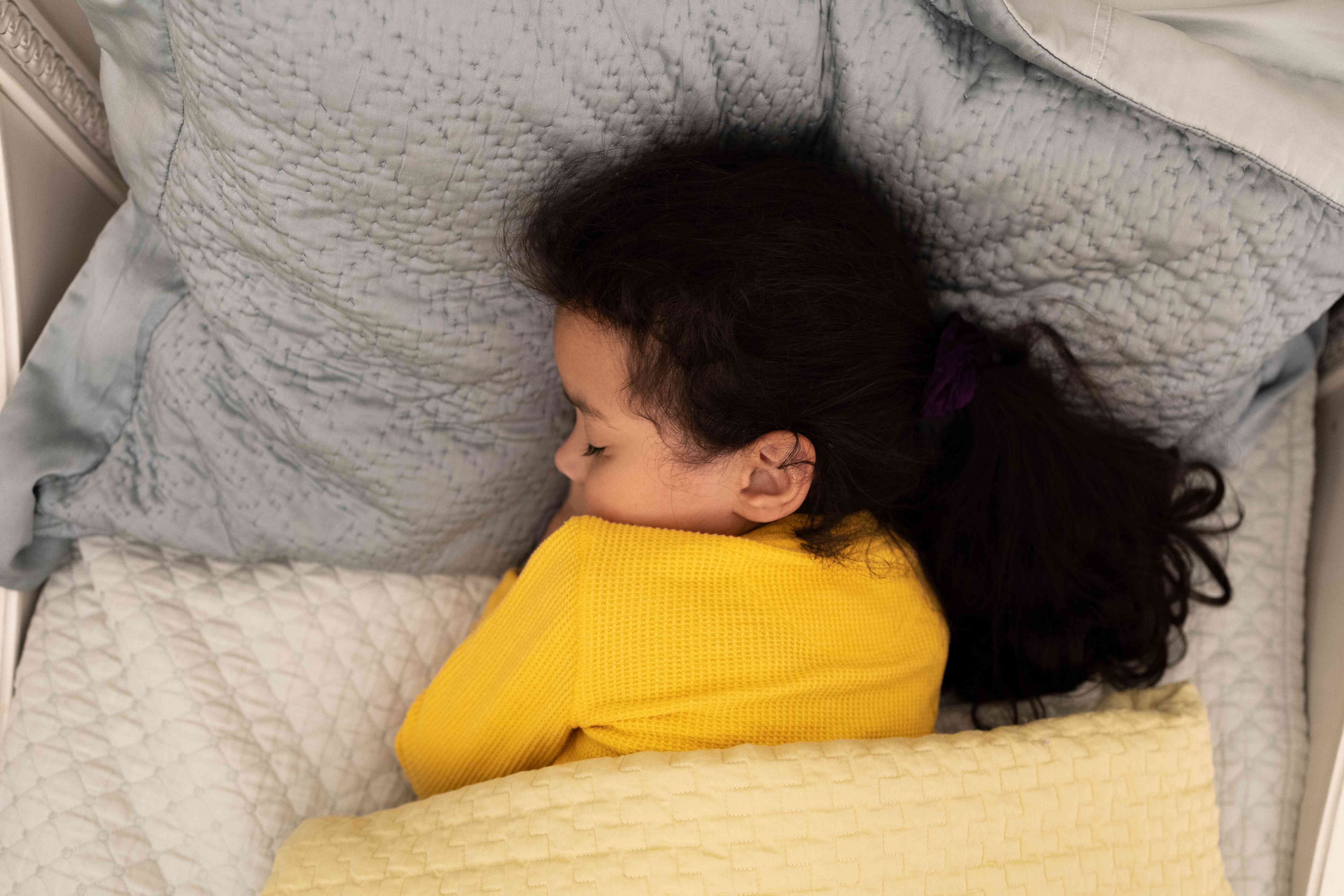Are Your Kids' Melatonin Supplements Safe? FDA Study Raises Concerns Over Mislabeled Doses Learn how to use melatonin safely and explore non-medicinal sleep strategies

Melatonin use in children is on the rise, but new FDA research reveals inconsistencies in supplement dosages

Catherine McQueen / Getty Images
- A new study by the FDA found that only half of melatonin products contain the actual dosage listed on the package—and many products marketed for kids had a much higher amount.
- Experts said the safest way for kids to consume melatonin is short-term use of a third-party tested product, under pediatric guidance.
- Instead of taking medicinal sleep aids, experts emphasized other methods to help kids fall asleep, like establishing a bedtime routine and limiting screen time before bed.
Melatonin use for children is on the rise, with nearly one in five school-aged kids taking it to fall asleep, according to one estimate. But a new study by researchers at the Food and Drug Administration has found that many products marketed for kids contain a lot more melatonin than their packaging suggests.
“This study raises a very important flag for much-needed regulations concerning supplement standard testing to make sure labeling is accurate and safe for pediatric products,” Sham Singh, MD, a sleep expert and psychiatrist at WINIT Clinic, told Health.
The research builds on previous findings, including smaller studies from 2017 and 2023, which found that most tested melatonin supplements geared for both children and adults were inaccurately labeled.
Here’s what else to know about this new research, whether experts think kids should use melatonin for sleep, and how to help your little ones fall asleep without using a sleep aid.
Can You Take Melatonin Every Night?What Is Melatonin?
Melatonin is a hormone that tells your body it’s time to sleep. The pineal gland, located in the middle of the brain, secretes it at higher levels when it’s dark outside and then decreases production as it gets lighter.
Melatonin is also sold as a sleep aid online and in drug stores. It comes in various forms, from tablets and capsules to liquid and gummies.
As a supplement, melatonin is largely unregulated by the FDA. That means there’s no assurance to the public that it works, won’t interact with medications, or even contains what its label suggests.
What Did the Study Find?
An FDA spokesperson told Health that the increased use of melatonin for kids motivated the agency to conduct “additional research to better understand the marketplace.”
For the study, researchers purchased melatonin products between May and September 2023 from Walgreens, CVS, Walmart, Target, GNC, or Amazon. Most of the items—54%—were gummies, followed by tablets and liquid. The products, 70% of which were marketed to kids, were tested to assess how much melatonin they actually contained.
What the researchers found was eye-opening: Only half of the products contained the amount of melatonin suggested by the package, and two items contained none at all.
Even more concerning is that some products packed in way more melatonin than advertised—one sample had a staggering 667% of the dosage listed. While the average dosage of 1.7 milligrams (mg) per serving fell within safe limits for pediatric consumption, the highest dose tested—50 mg per serving—far exceeded recommended levels for children, which the American Academy of Pediatrics puts at 0.5 to 6 mg.
The 10 Best Melatonin Supplements, According to DietitiansHow to Safely Use Melatonin
Given the variability in melatonin dosage across products, experts advise parents to proceed cautiously. The FDA spokesperson suggested that people talk to their doctor, pharmacist, or other healthcare professional before using a dietary supplement for their child.
If parents do decide to give their children melatonin, experts said it’s best to limit the length of time that they use the products.
Despite experts' longtime recommendation that melatonin be used "only cautiously as a short-term aid for children with specific sleep disorders, under pediatric guidance,” Singh said, studies show that many parents are giving melatonin to their children for 12 to 21 months or even longer. “There is not enough information to back up the safety of long-term use,” Michelle Caraballo, MD, a pediatric pulmonologist and sleep medicine specialist at Children’s Health in Dallas and an associate professor at the University of Texas Southwestern Medical Center, told Health.
Parents interested in melatonin for their kids should choose products from reputable and independently tested companies. A seal from third-party companies such as the U.S. Pharmacopeia and Consumerlab.com indicates that the supplement has been tested for identity and purity.
However, “while there may be brands more trusted or accurate, without oversight, even those brands cannot 100% guarantee that their product contains exactly the amount reported,” Caraballo said.
When using melatonin as a sleep aid, Caraballo said it's important to look for signs that your child may have had too much. Short-term side effects may include:
- Dizziness
- Headache
- Increased bedwetting
- Irritability
- Low blood pressure
- Nausea
How to Help Kids Sleep Without an Aid
Singh said that these latest findings may prompt healthcare professionals to place more of an emphasis on non-pharmaceutical options for sleep relief rather than melatonin use.
Whether you choose to give melatonin or not, having good “sleep hygiene”—the routine around bedtime—is incredibly important when it comes to helping your kids doze off faster. “Make sure that the room your child is sleeping in is slightly on the chillier side and that no extra lights are on,” said Caraballo. If they’re old enough, try to avoid having your child nap during the day, and it’s best if dinner is at least two hours before bedtime.
“Beyond these recommendations, establishing a bedtime routine and limiting electronic usage before bed helps children to reinforce their circadian rhythm,” Caraballo said. Instead, substitute screen time with wind-down activities, such as reading a book or listening to soothing music, Singh recommended.
This story originally appeared on: Health News - Author:Hannah Singleton


















